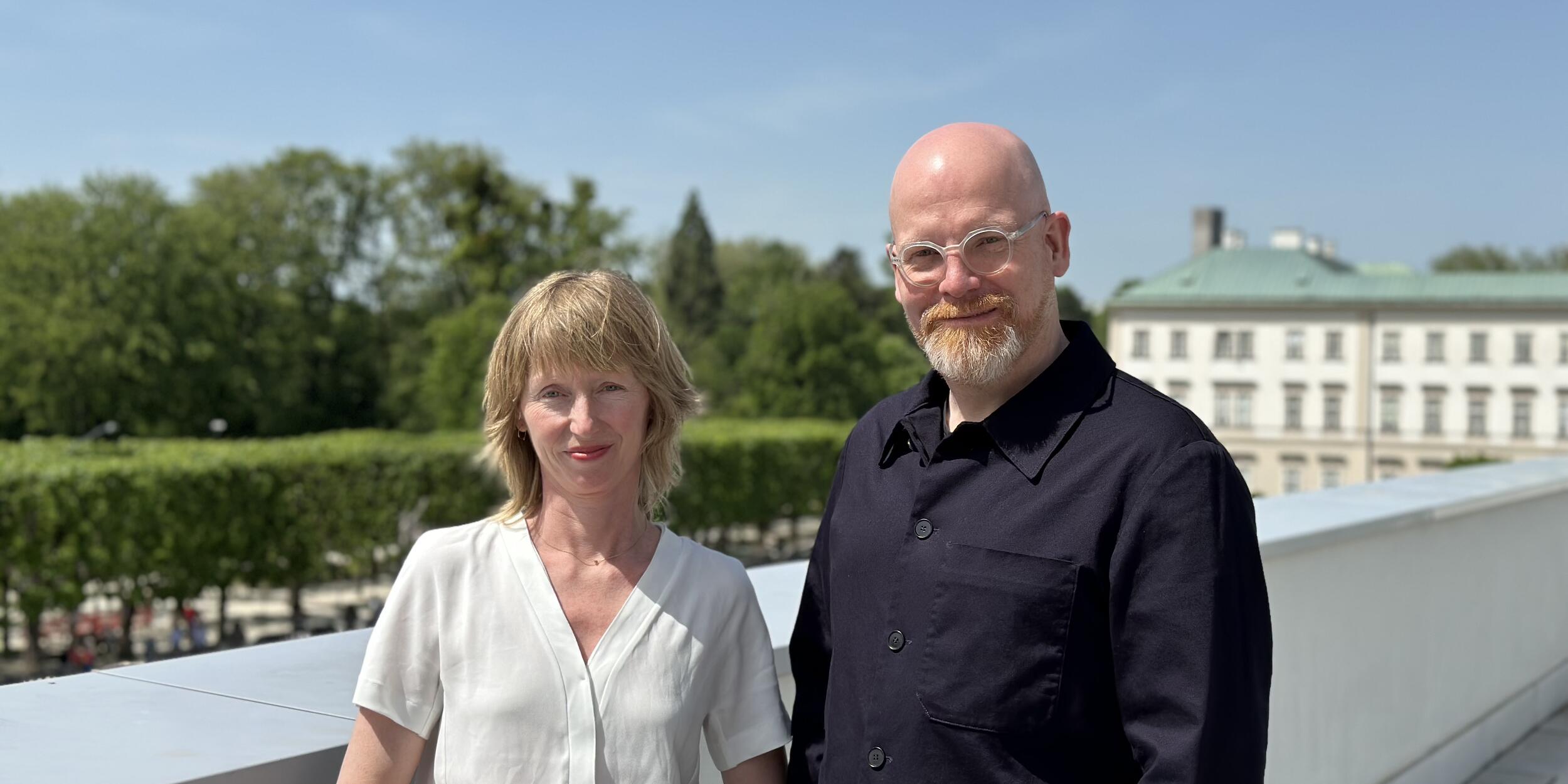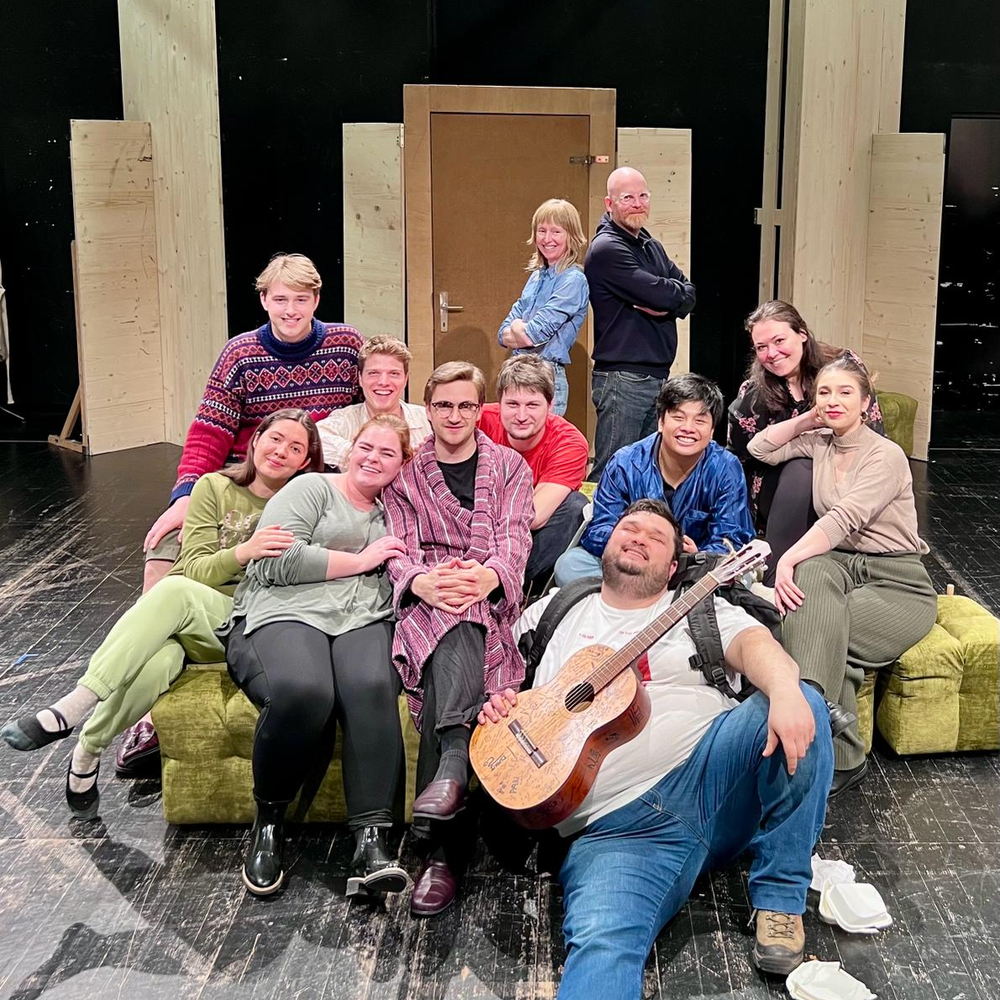Falstaff - A perfect comedy

On 15 May, Giuseppe Verdi's last opera Falstaff celebrates its premiere under the musical direction of Kai Röhrig and directed by Florentine Klepper. The two artists provide exciting insights into the production and its creation in a double interview.
With his last opera, Verdi laid the foundations for a completely new and modern musical language - incredibly complex, colourful and very precisely composed. The individual characters are also described in musical detail. Which aspects stand out in particular, where does it "humanise" the most in the course of the opera?
Kai Röhrig: Giuseppina Strepponi, Verdi's second wife, said of this opera that Verdi had founded a new genre with it and that Falstaff was also the only work in this genre. Indeed, Verdi's last opera, composed six years after Otello, is a highly original one-off. For me, Verdi subsumes his entire oeuvre here and at the same time casts a smiling and affectionate glance back at the rich Italian operatic tradition of the 19th century. Falstaff is also, above all, a passionate homage to the theatre. After earlier plans for an opera centred on the character of Sir John, Verdi only found a congenial partner in Arrigo Boito for the setting of this material based on various plays by William Shakespeare. The eighty-year-old composer's by no means age-weary view of the comedy's characters is as brilliant as it is passionate. What fascinates me is how Verdi translated the universality of the libretto into sound. He characterises razor-sharp and pointedly, always composing the momentum, so to speak. At the same time, his music "serves" the dramatic situation at all times and follows the characters in all their movements and emotions. For me, all this makes Falstaff one of the most ingenious works of opera literature. Everything is in balance here, every part is part of a greater whole. From the first to the last note, Falstaff is a perfect comedy with music.
Florentine Klepper: After weeks of intensive rehearsals, I now fully share Kai's enthusiasm for the work, even though I have to admit that I've always given Falstaff a wide berth. The play tells the story of love and life concepts of different generations, with the character of Falstaff as an aging womaniser acting like a system disrupter and bringing hidden longings and fears to the surface. On the one hand, I was always worried that the characters would become too clichéd in the sense of "young and naive" or "old and bitter". We are not exposed to this danger at all with our production, as we have a young ensemble throughout. This intervention brings the characters closer together and shifts the focus towards a character study of a young, modern generation. On the other hand, I find it a great challenge to develop the comedic template out of the scene, by which I don't mean "thigh-slapping humour", but perhaps more subtle and rather absurd moments that arise from the respective situation and don't seem contrived or old-fashioned.
My favourite moments are the large ensemble scenes, in which many actions take place simultaneously and, above all, at such high speed that we can almost no longer follow them while watching. While the students have to juggle virtuously between musical and acting precision, the characters gradually lose control of their actions.
Apart from the role of Alice Ford, this time all the roles have been cast individually - how did this decision come about?
Röhrig: Two years ago, with the opera Il Campiello by Ermanno Wolf-Ferrari, we placed the ensemble at the centre of our work. The ensemble is also the star in Falstaff. Of course, there is the gigantic title role, but apart from that, all the roles are very evenly weighted. Despite the arioso passages, the opera is above all an ensemble work throughout. From a pedagogical point of view, this is absolutely valuable and the intensive rehearsal work is an enormously enriching and community-building experience for our students. Everything thrives on togetherness, nobody "works" without the others. Fate brought Sergei Korotenko, our actor in the role of Falstaff, back to the Mozarteum after he had already studied here a few years ago. The war in his Ukrainian homeland is the reason why he is currently studying with us again on the postgraduate programme. Sergei's involvement has made our decision in favour of this opera possible. Due to the almost notorious challenges of the work and the relatively short preparation time since the beginning of the summer term, we decided not to double cast all the roles this time. It is therefore an intensive and compact collaboration for everyone involved.
Falstaff is an ensemble piece. There are hardly any "big arias", both the plot and the music are very interwoven. How did you prepare the students for this form of opera (which is very different to Humperdinck's Hansel and Gretel last winter semester) and awaken their desire to perform?
Röhrig: (Laughs) Thank you for the question! There was nothing to awaken. The enthusiasm for the opera was there from the very first rehearsal. Verdi's fire immediately spread to everyone and cannot be extinguished. All rehearsals are fuelled by the energy of the ensemble and the desire to "thunder this work onto the stage". In all my years at the Mozarteum, I have rarely seen all the members of the ensemble get so involved in the joint creative process.
Klepper: The collaboration of two colleagues was very helpful in the preparation: With Ulfried Kirschhofer, the students were able to try out different physicalities during a workshop. We realised right from the start that the music in Falstaff required movement. And Volker Wahl conducted a workshop on improvisation and slapstick with the ensemble. The aim of both workshops was to break down inhibitions, to experiment and, above all, to make suggestions for playing and to take up suggestions from colleagues.
The orchestra has a particularly strong voice in this opera, commenting on and developing its own motifs; the piece is also considered an "orchestral opera". How does your Falstaff live up to this claim?
Röhrig: I'm very excited about working with the orchestra. As Claudio Abbado's assistant, I was able to be part of his rehearsal of Falstaff at the 2001 Easter Festival. He had a lot of respect for the challenges of the work and even called the section leaders of the Berlin Philharmonic to Salzburg a few days earlier for the staged rehearsals. So suddenly I was no longer sitting alone at the piano in the orchestra pit, but together with twelve orchestral soloists. The intensive days with this responsive chamber orchestra meant that the transfer to the large orchestra a few days later was absolutely effortless. This "effortlessness" is difficult to achieve. Verdi's score thrives on many rapid changes. The orchestra roars so loudly that the roof flies off and then purrs the next moment to the tender duet of the young lovers. It underpins the jealous Ford's fit of rage, which is in no way inferior to that of Iago in the opera Otello, with dramatic outbursts, only to underlay the return of the spruced-up Falstaff with a swing number in the next moment. The countless breaks and rapid contrasts are both the appeal and the challenge of the score. The realisation of this work is a milestone for any orchestra. I am sure that the students in the orchestra pit will also feel part of a larger whole. While in many other Italian operas the orchestral musicians are in danger of falling into a coma from all the accompanying phrases, Verdi doesn't allow anyone a breather here. Everyone sits on the edge of their seats and is swept along. So I'm really looking forward to rehearsing this score with our university's outstanding symphony orchestra and finally being able to realise a Verdi opera at the Mozarteum again after many, many years.
Giuseppe Verdi and his congenial librettist Arrigo Boito laid the foundations for the tragic in the comic: How comedic does this Falstaff become? How much tragedy is there in the staging of this "commedia lirica"?
Klepper: The comedy is certainly predominant until the end of the fourth scene, but with Falstaff's aria "Ehi! Taverniere!" at the beginning of the fifth scene, the tide turns and the climate changes, fun becomes serious. No good comedy without a false bottom. We asked ourselves why Falstaff would even get involved in a second round after being exposed by everyone. Is he naive? Or is he a player who is too curious to turn down an (erotic) offer? Or does he - the outsider - simply want to belong? And why is there this repeat of the forbidden rendezvous at all? Is Alice just seeking revenge or does she - and the whole troupe with her - perhaps sense an opportunity to break out of her previous life and transcend boundaries? Perhaps a bit of everything. The influence of alcohol certainly plays a significant role in the game getting out of control. Falstaff serves as a kind of catalyst here. In Romy Rexheuser's stage design, doors literally open to another world. In any case, all the characters have an experience that night that will change them. What each individual makes of it remains open.
